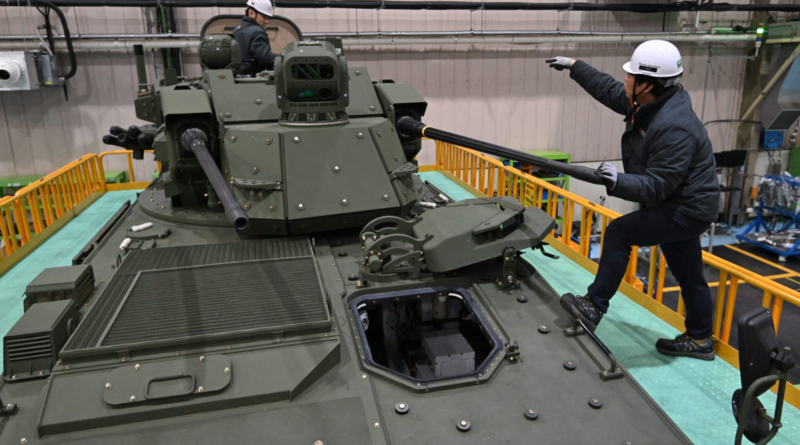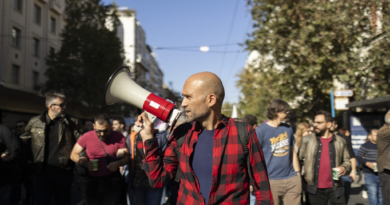South Korea’s arms industry, once seen as backward for focusing on land weapons, is booming post-Ukraine
At the outskirts of a South Korean industrial city, workers at a sprawling weapons factory were conducting final-stage testing for a newly built surface-to-air defence system that could, eventually, head to Ukraine.
Longstanding domestic policy bars Seoul from sending weapons into active conflict zones, but ever since its spy agency accused the nuclear-armed North last month of sending thousands of soldiers to help Moscow fight Kyiv, South Korea has warned it might change course.
If so, likely top of the list for Ukraine would be the “Cheongung”—or Sky Arrow—air defence system, a domestically-produced Iron Dome-style interception shield that AFP saw Thursday during an exclusive tour of the Hanwha Aerospace factory in the southern city of Changwon.
As the melody of Beethoven’s Fur Elise played on repeat over the in-house speaker, veteran welders worked on huge cylinders that will become part of the inceptor system, which is defensive in nature—although Hanwha also produces an attack-focused variant.
“The Cheongung system can be thought of as similar to the U.S. Patriot missile system,” said senior manager Jung Sung-young at Hanwha Aerospace, South Korea’s largest defence contractor.
Ukraine is reliant on Western air defence systems, particularly Patriots, to protect itself from Russian missile barrages—and has been calling for more deliveries.
Washington said in June it would prioritise deliveries to Kyiv, ahead of other countries that have placed orders.
But were South Korea, which remains technically at war with the nuclear-armed North and has maintained production of weaponry long ignored by Western arms industries, to get involved, it could potentially make a huge difference, experts say.
“As a divided nation, we have systematically established and implemented standards at the national level, from the development of these weapon systems to quality control,” said Jung.
“The quality, capability and manufacturing supply chain of our products is sufficiently competitive compared to those of other countries,” he added.
Whether—or how—South Korea decides to help Ukraine directly depends on “the level of North Korean involvement”, President Yoon Suk Yeol said earlier this month, adding Seoul was “not ruling out the possibility of providing weapons.”
If South Korea were to supply arms, the initial batch would be defensive in nature, Yoon said.
Combat ready
To fend off the steady barrage of missiles that have targeted Ukraine’s energy infrastructure and civilian areas, Kyiv urgently needs more air defences, Han Kwon-hee of the Korea Association of Defence Industry told AFP.
“Counteroffensives require stability in the rear zones, which is why Kyiv has also conducted drone attacks within Russia, including Moscow,” Han explained.
“They will help Ukraine hold off Russia’s offensives by intercepting drones and missiles flying deep into their territory,” he said—a huge boost for Kyiv, alongside the recent U.S. move to let it use long-range American missiles against targets inside Russia.
The South has remained combat-ready since its 1950-53 war with the North ended in a truce, and while Hanwha Aerospace, South Korea’s largest defence contractor, was once seen by analysts as retrograde for its focus on land weapons, it is now in high demand.
AFP saw a wide range of weaponry moving along assembly lines at the company’s sprawling Changwon factory, from infantry armoured vehicles to surface-to-air missile systems designed to intercept incoming missiles.
The heightened geopolitical tensions in Europe have heavily benefited the South Korean company, which saw its on-year operating profit soar over 450 percent in the latest quarter to $343.3 million.
It has signed major arms deals with countries such as Poland and Romania, including the export of K9 Howitzers and Chunmoo missile systems.
Weapons exports
Seoul has long harboured ambitions to join the ranks of the world’s top arms exporters—aiming to be the fourth-largest, behind the U.S., Russia and France—something that is now possible, industry research indicates.
It has already sold 155mm artillery shells to Washington—but with a “final user” agreement in place meaning the United States would be the military that uses the munitions.
Experts have said this allows the United States to then provide their own shells to Kyiv.
Hanwha’s other weapons offer that could shift the balance of war in Ukraine is its Chunmoo guided missile system, experts said.
“With a maximum range of 290 km (180 miles), Chunmoo can strike targets in Pyongyang if launched from the border area in the South,” said Choi Gi-il, professor of military studies at Sangji University.
“What Ukraine urgently needs to turn the war in its favour are offensive weapons like Chunmoo missiles and K9 howitzers, capable of inflicting significant damage on the enemy,” Choi added.
“If North Korea’s direct involvement in the war escalates, [Seoul] may consider sending lethal weapons, in addition to defensive ones.”



